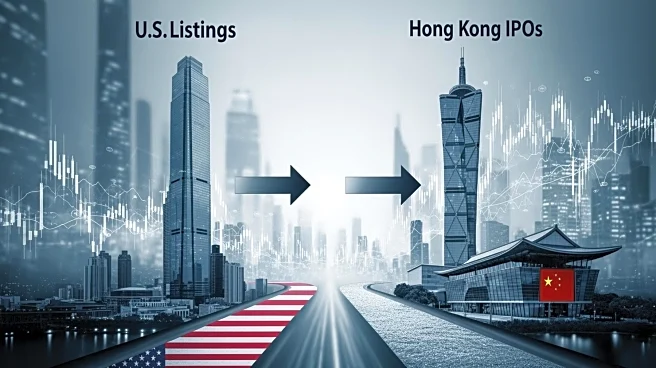What's Happening?
Chinese companies are increasingly opting to list in Hong Kong rather than the U.S., driven by heightened regulatory scrutiny and geopolitical tensions between Beijing and Washington. According to Dealogic,
Chinese IPOs in the U.S. have significantly decreased, raising only $875.7 million from 23 deals this year, a stark contrast to the $13 billion from 39 listings in 2021. This shift is largely attributed to Beijing's intensified oversight following Didi Global's controversial U.S. IPO. In contrast, Hong Kong has seen a surge in IPOs, with a 164% increase year-on-year, raising $18.4 billion from 56 listings. The Hong Kong market is bolstered by favorable fundraising conditions and regulatory measures aimed at facilitating technology and biotech company listings.
Why It's Important?
The pivot to Hong Kong reflects broader geopolitical and economic shifts, as Chinese firms seek safer and more favorable listing environments. This trend could impact U.S. financial markets, reducing the influx of Chinese capital and potentially affecting investor sentiment. Hong Kong's emergence as a leading IPO destination underscores its strategic importance in global finance, particularly for technology and biotech sectors. The move also highlights Beijing's regulatory influence over domestic firms, steering them towards markets that align with its strategic interests.
What's Next?
As geopolitical tensions persist, Chinese companies may continue to favor Hong Kong for listings, potentially leading to further declines in U.S. IPO activity. The Hong Kong market is expected to remain robust, with projections of up to 100 IPOs this year. U.S. exchanges may face increased scrutiny and regulatory challenges, impacting smaller Chinese firms seeking to list. Investors will likely monitor developments closely, assessing the implications for global capital flows and market dynamics.
Beyond the Headlines
The shift away from U.S. listings may have long-term implications for global financial markets, influencing capital allocation and investment strategies. It raises questions about the future of cross-border listings and the role of regulatory policies in shaping market access. The trend also reflects broader geopolitical dynamics, as countries navigate complex economic and political landscapes.










